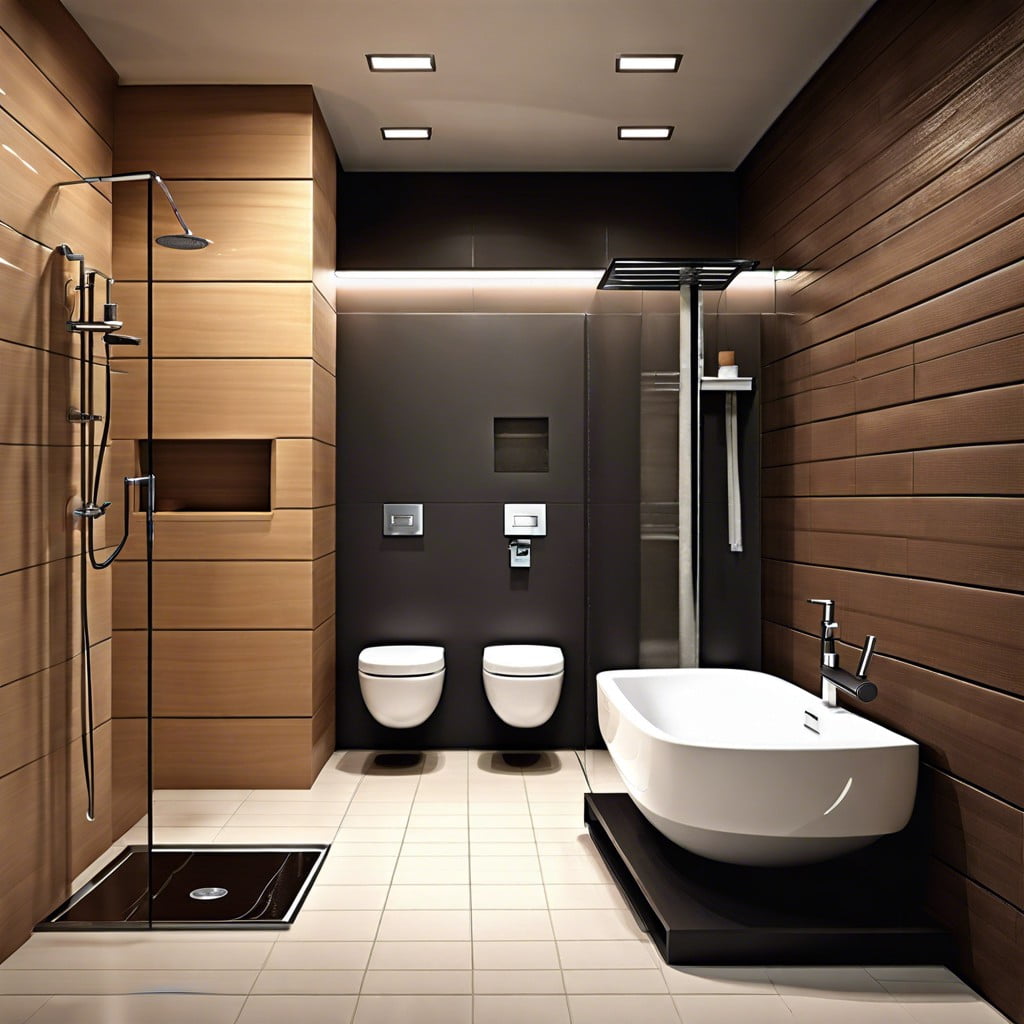Last updated on
In this article, you’ll learn about the origins and meaning behind the acronym WC often associated with bathrooms.
Key takeaways:
- WC stands for “Water Closet,” originating from the Victorian era.
- The term WC is widely recognized internationally, particularly in Europe.
- WC is known by different names in different languages and cultures.
- WC serves as a polite designation in public spaces and private homes.
- WC has evolved to encompass sustainable practices and environmental concerns.
Origins of the Term “WC”
Digging into history, one unearths that the term “WC” has its roots in the Victorian era of England. It stands for “Water Closet,” a euphemism employed during a time when discussing private matters was taboo.
Contrary to today’s open conversations about bathrooms, the 19th-century society opted for a more discreet reference to their private facilities. This term originally referred to a room with a flushing toilet, differentiating it from other types of facilities that did not have flushing capabilities.
The advent of the flushing toilet system transformed personal sanitation, leading to the proliferation of the term “WC” as it became a common feature in public and private buildings. The label “Water Closet” applied to these early flush toilets signified cleanliness and modernity, encapsulating the era’s shift toward more sophisticated waste management systems.
The Acronym WC Explained
The term “WC” stands for “Water Closet,” signaling the presence of a flush toilet. The “water” component emphasizes the flushing capability, while “closet” refers to the small, enclosed space.
Originating in England during the 19th century when indoor plumbing became more widespread, this abbreviation was a polite, discreet way to refer to a toilet facility.
Today, the term is recognized internationally but is more commonly used in Europe and some Commonwealth countries. It remains a compact, easily understood notation, appearing on signs and in architectural plans, continuing its legacy as a universal marker for restroom facilities.
WC in Different Languages
Traveling around the globe, the term “WC” morphs to align with linguistic standards but retains its fundamental identity.
In France, “WC” is commonly known as “toilettes” or sometimes “WC” with a French pronunciation.
Germans refer to it as “WC” or “Toilette,” pronounced ‘vay-tsay’ and ‘toi-lette’ respectively.
Italian stalls sport signs reading “WC” or “Bagno,” while in Spain, “Aseo” or “WC” is what you’d seek.
As we skip over to Eastern Europe, in Russia, it’s labeled as “туалет” (tu-a-let).
Moving East, in China, you might find signs for “洗手间” (xi shou jian), translating literally to “washroom.”
Despite the linguistic variations, the concept of “WC” as a sanitation facility is universally understood, demonstrating the pervasive influence of this seemingly simple acronym in diverse cultures.
Use of WC in Modern Society
Despite the ubiquity of the term “bathroom” or “restroom” in many English-speaking cultures, “WC” persists, particularly in Europe. It serves as a polite, yet clear designation in public spaces and private homes alike, preserving a hint of its historical roots without sacrificing functionality.
In signage, the brevity of “WC” is advantageous, offering a universally recognized symbol without the need for verbose explanations.
While the digital era’s influence permeates language, “WC” remains resilient. It’s seen in real estate listings to denote the presence of toilet facilities without the need for extensive description—efficiency in communication is key here.
Moreover, it’s a condensed, practical term in the travel and hospitality industries, a nod to cultural diversity and international standards.
In our environmentally conscious world, references to “WC” are evolving to embody sustainable practices. Discussions around “WC” now often encompass water usage, eco-friendly toilets, and waste management systems, reflecting society’s shift towards more sustainable living.
This reflects a broader tendency to amalgamate traditional terminology with contemporary environmental concerns.
WC Vs. Bathroom: Understanding the Distinction
The concept of WC is often conflated with that of a bathroom, yet they serve distinct functions. A WC specifically refers to the Water Closet, signaling a space with a toilet and often a sink. Historically, it’s a euphemism intended for polite society, while the term ‘bathroom’ denotes a room that includes a bath or shower, alongside the toilet facilities.
– A WC is primarily for toileting, while a bathroom may also accommodate bathing.
– In commercial or public settings, a WC might indicate a smaller, more utilitarian space without bathing facilities.
– Home design often merges WC and bathroom for space efficiency, muddying the distinction.
– Architecturally, separating a WC from a bathroom can provide an improved function and privacy in residences.
Understanding these nuances helps individuals navigate cultural differences and design choices in residential or commercial properties.
FAQ
Why is a toilet called a WC?
The term ‘toilet’ is commonly referred to as ‘WC’ because it’s an abbreviation of ‘Water Closet’, a phrase that originated in England during the 1870s and has evolved over time.
What does WC stand for in America?
In the United States, WC is abbreviation for ‘Water Closet’, which is another term for a toilet.
What does WC mean in slang?
In the realm of online slang, WC generally stands for "Who Cares".
What does WC mean in Mexico?
In Mexico, WC is an abbreviation commonly used to refer to a bathroom.
How is the term WC used in professional or architectural language?
In professional or architectural language, ‘WC’ is an abbreviation for ‘water closet,’ which is used to refer to a room or small enclosure containing a toilet.
Does the term WC hold different meanings in other cultures or countries outside America?
Yes, in many countries outside America, the term WC is commonly used to refer to a water closet, which means a toilet or a bathroom.
What is the historical context and evolution for the adoption of the term WC for toilets?
The term WC, standing for "water closet", originated during the Victorian era in England as an euphemism for a room containing a toilet, and its adoption was facilitated by the evolution of indoor plumbing and sanitation systems.
Recap




